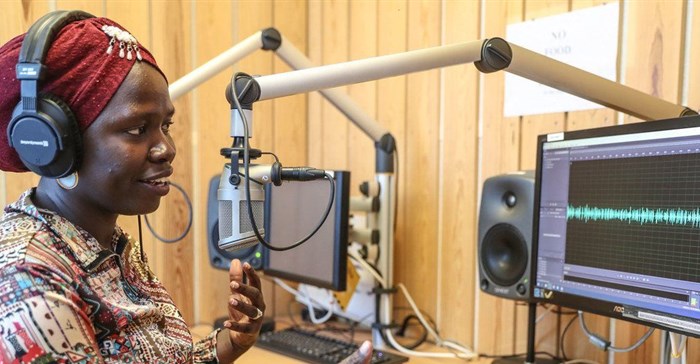For the most part, South African media, and journalists, experience democracy and freedom. However, there are spaces where journalists, in particular women journalists, are being threatened, physically as well as virtually.

Source © CGTN Africa
CGTN Africa Journalists, in particular women journalists, are being threatened, physically as well as virtually
Asanda Ngoasheng says that while we have heard of the situation in Swaziland, she believes South Africa is unfortunately yet another African country when it comes to threats against journalists.
“Whether these threats are physical or cyber, and although the South African government is in many ways not as oppressive as in other African countries, there are still threats by specific politicians and people who have a lot to gain by not being exposed in the media for corruption.”
Ngoasheng was one of the speakers at the recent South African Editors’ Forum (Sanef) webinar that examined the increasing violence against journalists, their safety, and their impact of this on the journalism profession.
Apart from being the Sanef Western Cape convener, Ngoasheng is a well-known speaker, political analyst, academic, and diversity trainer with a decade of experience working in different media and lecturer at the Cape Peninsula University of Technology (CPUT).
In particular, she spoke about physical and cyber threats against women journalists.
Threats to women journalists
“Women in newsrooms are experiencing high levels of attacks from men, including sexual harassment and violence, particularly when women challenge the status quo and start to ask difficult questions of politicians in power,” says Ngoasheng.
“Whether cyber or physical, any threat impacts how journalists approach the kind of stories that they do, the kind of people they engage, or talk to,” she says.
The Sanef Ethics Report found that women in newsrooms do not always feel safe from their own colleagues and other people who have access to newsrooms such as celebrities and politicians.
“Some politicians even ask for sexual favours in exchange for information. Women are often not able to talk about this as it is a very personal attack and there is a lot of shame around sexual violence,” says Ngoasheng.
It is difficult to work under these conditions, and while Sanef has started a health and safety committee, the industry needs to do a lot more to protect women, and newsrooms in particular need to take that responsibility.
“It has also had the unfortunate effect that many investigative journalists are men because it is a dangerous place for women,” she adds.
Amindeh Blaise Atabong, Edward McAllister, William Maclean 24 Jan 2023 Media houses taking responsibility
In terms of editorial management, often people are appointed as editors or as leaders in the newsroom, who are great at their job in terms of being a writer but don’t necessarily have management skills.
She says that newsrooms and media houses need to invest in the development of leadership and management skills to help cultivate a culture of emotional and physical safety.
“More must be done to provide physical support for people working on sensitive cases, such as bodyguards, especially when there are death threats.”
She adds that while some media houses are doing this, not all media house are. “The industry needs a more uniform perspective on how to provide emotional and physical support to journalists as well as to equip them when they are going into dangerous situations.”
The bottom line, she says is that media houses must support the journalist.
“However, while the responsibility for ensuring the safety of journalists lies with the newsrooms and their managers, it also lies with all members of society from civil and business to general society.”
The responsibilities of civil society, business and society
The role of civil society and business is to highlight these issues and put them on the agenda.
“Important research has, and is, being done by civil society bodies on the violence and the extent of the violence that journalists face. It is important to quantify the problem if we are to find solutions.”
General society can also not be silent on this issue. “Too often we hear someone being interviewed slander the media, and derogate the integrity of the media, or question the ethics of media.”
She says while there is nothing wrong with questioning the media when you do you need to be aware of your potential to discredit the validity and the important role that the media can play.
“Unfortunately, in SA we are seeing an increasing lack of tolerance for journalists. Journalists are being beaten, attacked, and even shot at when they cover stories.”
She points out that ironically journalists are finding themselves under attack especially when covering community-led protests.
“This is because the community does not always understand the role of the media and journalists and the importance of journalists covering these very issues.”
Political parties also need to take responsibility. “Political parties often make statements that the media is bought or sold, and the media does not care about you as the people. These are very dangerous statements as they inform the ways in which people engage with and relate to the media,” she states.
The importance of journalism
Civil society, business, and society in general need to re-emphasise the importance of journalism as a trade and its role in society.
“If journalists start being too scared to cover stories, then we won’t know what is happening. State capture would not have been exposed if it was not for journalists putting their lives on the line. This goes for all other stories that help us as citizens, whether in SA or elsewhere, to have an understanding of exactly what kind of world we are living in and what is happening in our communities,” she says.
“If journalists feel they cannot report without fear or favour, based on who and how and where they are reporting on, we are running the risk of losing the potential of having a diversity of opinions.
“We need to support journalism - while questioning it when necessary - so that people don’t feel that the media and journalists are the enemies,” adds Ngoasheng.
This Sanef webinar was supported by Sanlam, showing how businesses can support journalists and the media.










































